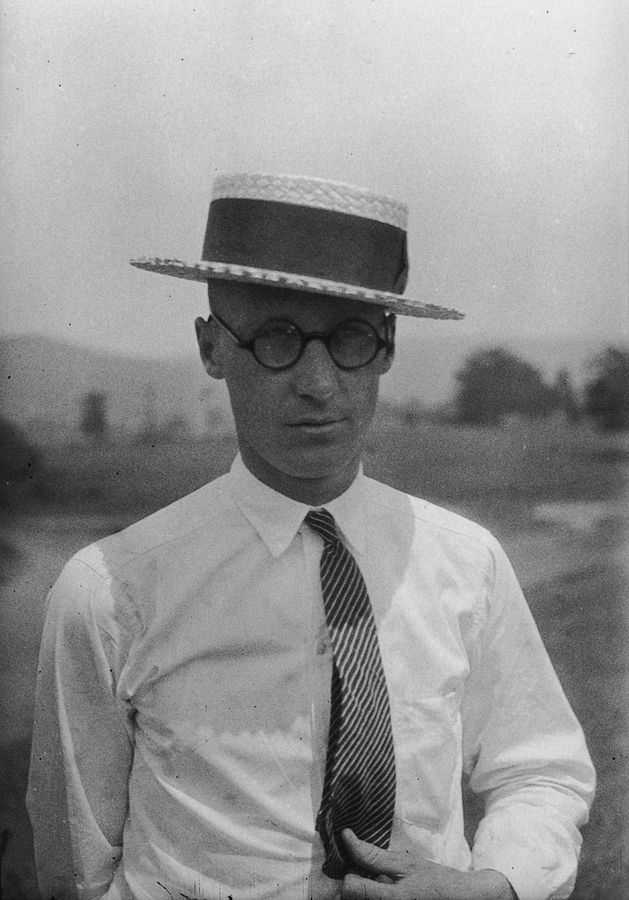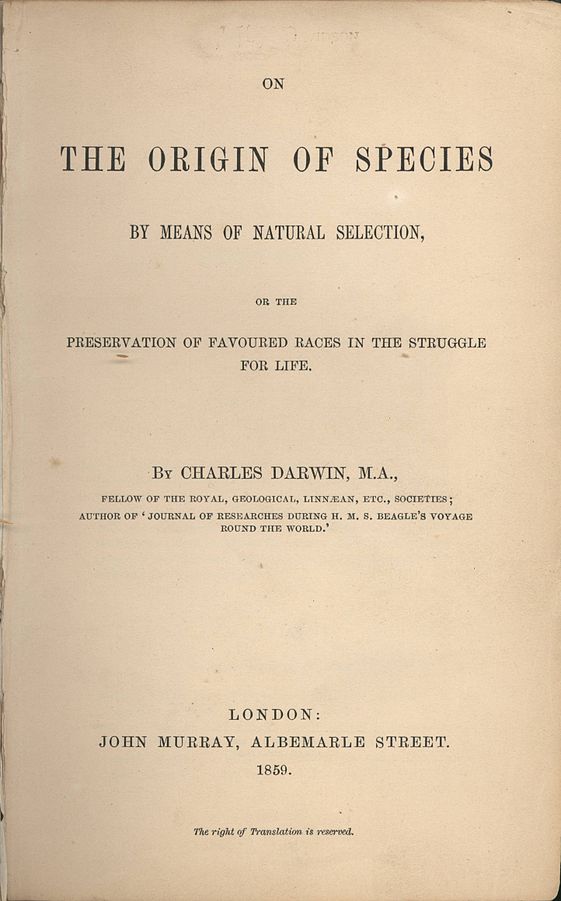Controversies over the theory of evolution are well documented in American society: according to a Gallup poll conducted in the late 1990s, 44% of the American public rejects it in favor of the Biblical account of creation. Has this always been the case? Did Charles Darwin and early proponents of evolution encounter the same objections when the theory was first proposed in the late 19th century? And did evolution come out of nowhere as a radical new idea, taking the world by surprise? Not necessarily, as it turns out.
In an episode recorded on location in London, Adam Shapiro from Birkbeck University describes how evolution was first received in the United States, and the debates that led up to its most famous test–the Scopes “Monkey Trial” held in Dayton, Tennessee, in the 1920s.
Guests
 Adam ShapiroLecturer in Intellectual and Cultural History at Birkbeck – University of London
Adam ShapiroLecturer in Intellectual and Cultural History at Birkbeck – University of London
Hosts
 Joan NeubergerProfessor of History, University of Texas at Austin
Joan NeubergerProfessor of History, University of Texas at Austin
Joan Neuberger: Hi, I’m Joan Neuberger, editor of Not Even Past and your host for today’s episode of 15 Minute History. And we are in London today taping on our laptops instead of in the UT Studios, so the sound quality may not be up to our usual standards. But I’m in London because I’m here with Adam Shapiro, who’s an historian of science at Birkbeck University of London. Hi Adam, welcome to 15 Minute History.
Adam Shapiro: Hi Joan, thanks for having me.
Adam’s going to be in Austin on April 17th [2015] to speak about his research on natural theology and the debate over slavery. And today we’re going to talk about the early reception of evolution and Darwinism in the United States. So let’s start off by talking about how controversial it was. Was evolution a controversial topic in the nineteenth century?
In some ways it was quite controversial. You have a range of religious opinions. Some people immediately declaring that Darwinism is atheism, but you also have a lot of people who are trying to reconcile—or are successfully reconciling—evolution with their religion or even saying that evolution strengthens their belief in a god. You’ve got a full range and a very wide range of debate and people who are in public speaking, societies are debating the issue quite open mindedly. Controversy suggests that there’s something at stake and I wouldn’t call it controversy because of that.
So there were differences of opinion, but it wasn’t very heated yet.
Not compared to, say, today.
So why then does an anti-evolution movement arise?
Well, it makes sense to me. Evolution doesn’t really become controversial until it’s being taught in the schools. So in the nineteenth century, that’s not what’s going on. It’s in the early twentieth century, in the 1910s and 1920s, that you begin to get the development of a new school subject of biology, and that’s really when anti-evolution becomes a movement.
So they only started to teach biology at the end of the nineteenth century?
They had been teaching different forms of the life sciences. If you walked into a science classroom in a high school in America in the late nineteenth century, you’d probably see two separate semesters: one of botany, one of zoology, and a little bit of human hygiene and human physiology tacked on to the end. Some places might of called that biology but that was largely a “lets publish two textbooks together” or “lets integrate under a single department as a cost saving measure.” What starts the change in the 1910s and ‘20s is a recognition that plants and animals actually have a lot more in common than previously understood.
So botany, plants, zoology, animals, why did they come together suddenly?
Scientists had understood that plants and animals have a lot in common: they both contain cells, they both engage in reproduction that makes use the laws of heredity, they’re both products of and subject to the laws of evolution, and they’re both involved in metabolism. There are also plants and animals, things that human beings use in practical applications. And it used to be the case, in a mostly agricultural country, that raising livestock versus growing crops was a very different process. But as the country became more urbanized and more industrialized, the reasons for keeping those apart became less and less necessary.
What changed in terms of the public school system that affected the teaching of biology?
At the end of the nineteenth century you’re beginning to get really shifting demographics in America. You’ve got a new influx of immigration, especially in the major urban areas (New York, Chicago, Philadelphia), and there’s a real recognition that, for most of the people living in these urban environments, you don’t have as wide an experience of plants and animals. But what you do have is a pressing need for social welfare and for dealing with hygienic conditions. Zoology changes when the most experience you have of animals is rats and roaches.
So you begin to get this new teaching of biology around the 1910s, what comes to be called ‘civic biology.’ It takes these central principles, the cellular theory of metabolism, evolution, and heredity, and it integrates them into the curriculum around the idea that the reason why you would teach these is because they have practical applications. So the reason you teach about cellular theory is because you’re teaching about quarantine and disease prevention and the germ theory of disease. And the reason you’re teaching about metabolism is because you’re teaching about a healthy diet, you’re teaching about food safety, and your teaching about alcohol consumption in these years leading up to prohibition. The reason why you teach about evolution has more to do with the cultivation of artificial breeds of plants and animals for human consumption. And heredity has to do with sexual health and it has to do with eugenic applications across society, the heredity of criminality or so-called feeble mindedness.
Was evolution the only thing that was controversial about the new biology?
Not at all. In fact, one of the first things I saw when I was doing some research on this was, in 1914 one of the first textbooks comes out that teaches this, it’s called Civic Biology, and the first time it becomes controversial is almost just a few months after it’s published. And it’s because of the teaching of eugenics. Not because eugenics itself was seen as greatly controversial, but because of the somewhat sexually explicit language that was used to describe it. And at the time, the editors of that textbook almost joked that if they bend to accommodate every opinion, what’s next? Someone’s going to complain about evolution? Ten years later it’s not a joke.
So why were books like Civic Biology used in places like Tennessee?
Yeah, this is the problem. This is perhaps the unforeseen chain of events that leads up to the big anti-evolution clashes, culminating in the scopes trial of 1925. These books like Civic Biology were intended to be used in the urban industrial centers of American industry. They were intended to be used in places like New York, where most of the textbook authors had actually been from. But especially in places like Tennessee and elsewhere in the south, textbooks were adopted at a state level. So you couldn’t adopt one book for Memphis and another one for a small town like Dayton, Tennessee.
—But you could do that in states like New York and Illinois?
Yeah.
So they had local adoptions or something.
It seems to me that mostly the southern and western states moved toward a state-adoption model. The main reason why they did it was not to control textbook content—which is what we normally think about when we think about adoption controversies today—the main reason they did this was an effort to negotiate bulk deals and get lower prices and the concern that the textbook companies were engaging in illegal kickback schemes or bribery schemes. It was an anti-corruption measure. It wasn’t about policing school content.
So how does it get adopted in Tennessee?
Tennessee adopts that same book that I talked about that was controversial in 1915. They adopt a 1914 textbook called Civic Biology. They do that in 1919. And at that time the state was still extremely rural, extremely poor, extremely low to other states in terms in literacy. But there’s a highly progressive effort towards modernizing the state. And that really comes to a head in 1924, and it really takes a head in the period leading up to the Scopes trial in Tennessee.
Tell us about the movement for progressive education in Tennessee and how that conflicted with the growing movement of anti-evolution.
Well if you think about what these books taught, it isn’t that it just teaches evolution, it is essentially teaching an ideology of urban, industrial progressivism. The point of schooling, the point of teaching children, is to prepare them for life in a modernized society. And in 1924, the year right before the Scopes trial, there’s a strong effort by the governor of Tennessee to expand compulsory education, to build more schools in the state, to build teacher training colleges, to generally try and modernize the state and make it more competitive in a national environment, by bringing the tools of modernity, if you will.
And this was deeply controversial, not just because of the money involved, although that was part of it, but also because of the idea that this was a kind of cultural engineering. If I was the parent of the child living in rural Tennessee at the time and I’m suddenly told that my child is going to be forced to go to school and the content of what their going to be taught is being decided at the state capital and I’m going to have almost no say in the matter, and moreover what the state seems to decide to teach is about how to move away from the farms and work in the factories and live in the big cities, I don’t need to open the bible up to tell you why I have a problem with this.
What happened to the governor’s effort to modernize the schools?
The governor realized that this was going to be deeply controversial. And even before he proposed the legislation to overhaul the schools, he recognized that, in 1924, the 1919 adoption was going to expire. And because they had signed the five year contract (there was going to be a new contract), prices had gone up quite a lot in the intervening five years. And by this point, most of the textbooks were purchased directly by school parents. So that was a direct cost felt by people who voted. Suddenly, they were going to feel a 50%, perhaps more, increase in the textbooks. It was going to happen two months before he was running for reelection. So he comes up with this plan that: if people by their books a little bit early, they can basically squeeze a sixth year out of a five year adoption cycle and postpone the decision about adopting new books until after the election and until after he has the mandate to pursue his reform.

The side effect of that is that it leaves an eleven year old, relatively out of date, textbook called Civic Biology in the hands of John Scopes in the March of 1925. Whereas, if you look at what could have been available to be readopted in ’24, most of the newer books had actually begun to bend because of the lobbying of anti-evolutionists. They had started to change their content or talk about evolution in a slightly less confrontational, or more apologetic, way.
Now after the governor gets reelected, he tries to push this legislation through and it goes nowhere. It stalls in the legislature and a second version of the bill is in the process of being stalled when the state legislature passes the anti-evolution law. And a lot of people are writing the governor, telling him to veto it. Others are telling him to sign it. He waits until the last day possible, ten business days, and he ultimately decides to sign the bill into law. The next business day after he does this, debate begins to proceed on the general education bill. It was clear quid pro quo. So the anti-evolution law comes into being partly as a compromise to get very general progressive education reform passed.
So the progressive general education reform bill gets passed, while at the same time there’s a law prohibiting the teaching of evolution.
Yes, which really wasn’t seen as being a central complaint.
It wasn’t a huge issue yet. But there was some kind of anti-evolution movement already?
There was. And it begins really right after books like Civic Biology get started. You have a longer religious rhetoric, going back to even before Darwin, but throughout the nineteenth century of people saying that Evolution contradicts my interpretation of religion. But that wasn’t an organized movement. But this movement that was not just concerned with Evolution, but was concerned about the centralization of school control and the compulsory expansion of state schools, coopted that religious language. And they began to use that language. And there was overlap of who was involved in what. And very quickly that school movement decided that evolution was probably the most popular of the many issues that they could use because they could very easily point to a conflict with religion as they saw it.
Ok, so that all sets the stage for what became this celebrated trial, the Scopes trial. So what was the Scopes trial?
The Scopes was one of the strangest and most elaborate public events of the twentieth century of the United States. On the face of it, it’s a small town misdemeanor trial in which the person accused faces the risk of a penalty of a $100 fine. It’s not a major legal event. The conviction gets sets aside on a technicality. It doesn’t get to the US Supreme Court. It doesn’t have any legal weight, but it is a huge public event because some of the most famous and most important people of the day deliberately decided to get involved. Most famously William Jennings Bryan, formal Presidential candidate and secretary of state who’s one of the most outspoken anti-evolutionists of the time offers to assist the prosecution of John Scopes. And Clarence Darrow, who’s perhaps the most famous defense lawyer of the period, offers to be one of his defense lawyers. So very quickly, the State of Tennessee versus John Scopes devolves into Bryan versus Darrow.
And he was accused of violating the law prohibiting the teaching of evolution.
The law is a little bit strange. It officially doesn’t prohibit the teaching of evolution. All it prohibits is the teaching of human beings from nonhuman ancestors. If you pour over the pages of the book that John Scopes used when he was substitute teaching for the biology class, you could make a very strong case that he never actually taught this, that the book never actually contains this. But obviously, an acquittal would have completely invalidated the case. The point of the case was to create the show trial. The point of the case was never about the guilt or innocence of John Scopes.

So, we have two very, very famous lawyers debating each other. What, in addition to that, made it attract so much public interest?
I think there was this very deliberate attempt to create that public interest. John Scopes relates in his memoir, that the people in Dayton, Tennessee, the town where he had been teaching, saw an advertisement run by the ACLU (which at this point was a fairly small organization centered in New York), saying that they would offer free legal support to any teacher that would legally stand trial for violating the anti-evolution law. And they decided that if there was going to be a trial in Tennessee, it might as well be in their town because it would be a great publicity stunt. And Scopes agreed to do this because he opposed the law. But the people of Dayton immediately started issuing publicity pamphlets that are quoting Sinclair Lewis’ Main Street USA, saying the reason this is happening in our town is not because we are a strange or abnormal place but precisely because we are the quintessential American town and this is the quintessential American debate, between science and religion is the epic question of our time.
So then how did the trial then shape the debate between science and religion?
It’s weird. Everyone agreed that the Scopes trial was about science and religion, but they didn’t all agree on what the science was and they didn’t all agree on what the religion was. And in some ways what happened was a lot of speaking past one another, as opposed to a constructive debate, where people didn’t even recognize what the other person meant or what people on the other side meant. Most particularly, Clarence Darrow describes Bryan’s view as a complete caricature in which he sees Bryan as believing in a 6,000 year old earth, which Bryan himself says he doesn’t believe in, but also in saying that he says the bible ought to be interpreted literally when Bryan himself will say things like “The bible is true, but I’m not quite sure necessarily how to interpret it.” So there is a lot of subtlety that is getting blown away with the idea that this has to be an epic clash. And then we need to redefine the terms to fit that after the fact.
So it becomes a big media event, a big event that really simplifies the issue in a way.
Yeah, in a way, it’s less the case that the issues of science and religion become a media event. It is more the case that a media event was looking for the issues to tell the story, and it seizes on the science and religion narrative to do that. In a way, the Scopes trial teaches us what this sort of trope of evolution trials is supposed to be. One of the things I’ve been looking at lately has been a trial of a teacher in Nebraska, who lost a job of three years before the Scopes trial because he was accused of being a Darwinist. He went to court and sued for slander and he won. And this was a case that basically fell off the map. Nobody paid attention to it. It took place in Lincoln, Nebraska, where William Jennings Bryan had been a congressman earlier in his life. And yet, in a pre-Scopes world, that whole narrative of evolution trial hadn’t existed yet.
So what’s the biggest difference between evolution controversies in the twenties and what’s going on today?
Well, for one thing there are several different anti-evolutionary arguments out there that were not being made in the ‘20s. And the arguments that were being made in the ‘20s don’t seem to still be as present. In the 1920s, William Jennings Bryan was very explicit that he wasn’t advocating for a 6,000 year old earth, despite the fact that that’s what Darrow had accused him of. Now-a-days one of the largest voice for anti-evolution is Ken Ham and his creation museum based in Kentucky, which explicitly do endorse that and insist on a literal interpretation of the book of Genesis, that implies that.
But for both of those young earth creationists, and for other forms of anti-evolution like intelligent design, the most important thing is the necessity of being recognized as scientific. That has a lot to do with the way that legal cases have evolved since then. But I think the biggest difference, and perhaps even more than the substance of anti-evolution, is just the balance of power over who controls the schools. Back in the 1920s you see correspondences from textbook salesmen saying ‘It’s easier for me to convince a state board to change their curriculum to match my textbook than it is for me to convince my editor to change anything.’ Now it’s completely the other way around, and you see that particularly in places like Texas, where state adoption is such a big business and the kinds of political interest in every state adoption has been so meticulously scrutinized that whoever controls the political elements is able to control the content. No textbook company wants to go even near a controversy.
